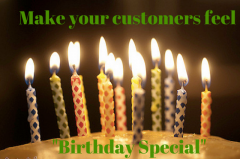By Laura Petrolino
Guess what this week is?
It’s the most wonderful week of the year…
No, it’s not personalized communications in the digital world week.
IT’S MY BIRTHDAY WEEK!!! WOOOHOOOO!
A lot of you probably know this by now because I’m not quiet about it…at all. I tell everyone, everywhere, repetitively and consistently about my birthday.
I drop it into casual conversation, I blatantly bring it up in conversation, I post it everywhere.
I am a one woman walking birthday card to myself.
I’m shameless and I don’t care because IT’S MY BIRTHDAY!!!
But here is the amazing thing: Despite the fact I tell everyone. Despite the fact I’m an only child so my parent’s really don’t have a lot of birthdays to remember. Despite the fact I’ve always had fantastic birthdays—surprise parties, dinners, amazing times with amazing friends.
Every year I’m panicked my birthday will be forgotten. No one will remember and it will be just an average day, uncelebrated.
My parents, knowing this (at this point in my neurotic life) make sure to call or text me first thing in the morning to wish me a happy birthday.
They know if they don’t, I’ll wait anxiously, afraid they’ve forgotten.
How Do You Make People Feel?
Birthdays matter to everyone, whether they admit it or not. Maybe not in the same neurotic, slightly obsessive (or majorly obsessive) way they do to me, but they matter.
Why? Because it’s the one day that is your own. Sure you might share it with other people—and I love my birthday twins—but it’s your day.
It celebrates you—the fact that you live, and made it through another year.
And it lets you know that people care enough to be part of a day that celebrates you.
Everyone wants to feel special and cared about as a unique and valued individual. A birthday is one of many representations of that.
So why does this matter to us as communicators? Because communication is really about how you make people feel. It’s easy to communicate with a crowd, like a crowd.
The art of what we do is being able to communicate to a crowd while making each person think you are talking directly to them. That’s effective communications.
One of my very first posts on Spin Sucks (prior to employment at Arment Dietrich) was about the importance of addressing someone by their name. Try it.
Start using people’s actually names more often and watch how the relationship changes. It’s the same dynamic as birthdays.
Personalized Communications in the Digital World
Unfortunately the technologies we now have at our disposal can be used for both good and evil when it comes to personalized communications.
Sure you can merge a name to an email blast or set a birthday autoresponder, and there is nothing wrong with either of those tactics, but personalized communications is more than that.
It’s about being customer-centric in all things you do.
One of the main values we hold dear here is the fact we are exceptionally client-focused. This means we work really hard to understand our clients.
Not just their businesses (while that’s obviously important as well), but who they are as human beings.
This allows us to be maximumly effective in our work. We create strategies and work with them as partners in a way that’s completely unique to them, addressing their needs, fears, and possible obstacles.
For us, that’s a key part of how we personalized communications.
What’s another common tactic? One most of you probably use, but might not even think of as personalized communications? Storytelling.
Stories resonate with people. They allow each one of us to grab a part of the story and apply it to our own lives. Storytelling is personalized communications at its finest.
A Checklist for Personalized Communications
I was putting together a nice little checklist to help you think through ways you could make your clients and customers feel special through personalized communications when—voila—I found a great one. Yay Internet!
- Relevancy: Is this communication really relevant to every person who will receive it? Or, am I just hoping a few people will find it was written for them?
- Significance: Is there really enough value—to the recipient—to warrant this message? Would I take advantage of this offer or information, as a consumer?
- Honesty: Is this an attempt to do something that isn’t really in the best interest of the recipient (is the real motive truthful or simply about salesmanship)?
- Helpfulness: Will this communication be viewed more as a nuisance or is it truly trying to help someone achieve something positive?
- Simplicity: How hard have we made it to understand what’s being offered…and what we want people to do? Are there terms and conditions where we’ve buried some “gotchas” people have to hunt for and find?
In a nutshell—authenticity, clarity, and resonance.
What are some of your favorite ways to help your customers feel special and individual?
